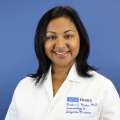From acupuncture to cannabis and mindfulness to the microbiome, integrative medicine encompasses healing modalities that haven’t traditionally been part of Western medical practice.
“Integrative medicine is a conceptual framework through which we see health,” says Elizabeth Ko, MD, medical director of the UCLA Health Integrative Medicine Collaborative and an assistant clinical professor of medicine at the David Geffen School of Medicine at UCLA. “It can be practiced by anyone — by a primary care physician, an endocrinologist, a physical therapist, a dietitian, a dermatologist or a surgeon.”
“It’s really about this transition from a disease-informed model of health care to a health-promotion model,” adds Rashmi Mullur, MD, associate professor of medicine at the David Geffen School of Medicine at UCLA, an endocrinologist and educational pillar lead of the UCLA Health Integrative Medicine Collaborative.
To address growing interest in this whole-person approach to health and healing among practitioners and patients, the UCLA Health Integrative Medicine Collaborative is presenting a daylong educational event, “An Integrated U: Healing from Bench to Bedside,” to be held virtually on Friday, Nov. 5. This scientific conference provides continuing medical education for health care providers and is free to the public.
With wellness spas and alternative-health centers springing up across Los Angeles and nationwide, it can be hard to decipher between what’s trendy and what’s scientifically sound.
“Our calling is to promote and practice rigorous, academic, evidence-based integrative medicine,” says Dr. Ko. “There’s a lot of misinformation out there, and patients are craving knowledge. Our commitment to upholding the highest standards is how we will separate ourselves from the rest of the world.”
Supported by the NIH
The conference was designed to provide an overview of key areas of integrative medicine supported by National Institutes of Health, Dr. Mullur says. The five NIH categories are: mind-body approaches, deep-rooted holistic models such as Ayurveda and traditional Chinese medicine, energy-based approaches, manipulative-based approaches such as chiropractic care and the use of natural products or supplements.

“Our conference covers all of the broad categories from the NIH, and does so from a whole-person, multidisciplinary perspective,” says Dr. Mullur.
And it’s all with interdisciplinary implementation in mind. From primary care physicians to physical therapists and psychologists to dietitians, health care providers of all kinds can expect to learn how to incorporate integrative medicine approaches into their day-to-day practice, Dr. Ko says.
The event features a keynote lecture from lifestyle medicine physician and researcher Dean Ornish, MD, and participatory experiences with guided meditation and yoga therapy.
Growing interest in integrative approach

Public interest and a growing body of research supporting the effectiveness of these healing modalities suggest integrative medicine is becoming more mainstream.
“There’s data from other health systems, like the VA, that show that this is beneficial and cost-effective, so I think we are headed in that direction,” Dr. Mullur says. “I think the patients are ready. What we need to do is provide that evidence base and not just falling into the world of wellness and adding on modalities that don’t actually serve an underlying purpose.”
The COVID-19 pandemic has also inspired many to reassess what good health means to them, she adds.
“Integrative medicine requires an approach where you prioritize and focus energy on the things that are actually promoting health,” Dr. Mullur says. “And that’s what we are aiming to do by providing this education, to get everyone on the same page.”
Another aim of the conference is to make integrative medicine approaches available for the whole community, she says, “not just our wealthy, insured population.”
Because integrative medicine can have such powerful implications for chronic conditions, it’s important for all patients to have access, Dr. Mullur says.
“We want providers to leave with practical tools on how they can start incorporating and practicing integrative medicine with a focus on equity of care, understanding the impact of structural racism and disparities in health care on stress, fatigue and chronic pain,” she says. “We want to support our most vulnerable.”
But no medical training is required to extract value from the inaugural Integrative Medicine Collaborative Conference, Dr. Ko says.
“We hope that patients will be inspired by our work and take away some clinical pearls they can incorporate into their daily lives,” she says. “We want to bring visibility to the collaborative, which includes more than 30 programs, and showcase the breadth and depth of resources we have at UCLA Health.”
Here’s a look at the presentations planned for the conference. For more information on the program, visit the Office of Continuing Education.
- What’s preventing us from preventing Alzheimer’s disease?
- Cannabis: Pathway to health, placebo or peril?
- Personalized nutrition for chronic disease management and optimal health
- Brain-gut-microbe interactions: Who’s in charge?
- Mindfulness practice: An integrative approach to promote sleep health, augment anti-viral immunity and reverse inflammation
- Complex solutions for complex problems: East-West Medicine for functional disorders
- When cancer calls into question everything you thought you knew
- Primary care panel: Bringing IM into your practice
- Keynote lecture: Dr. Dean Ornish on the transformative power of lifestyle medicine
- Experiential sessions: Yoga therapy and guided meditation





